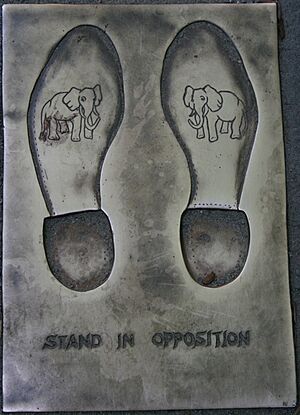Opposition (politics) facts for kids
In politics, the opposition refers to one or more political parties or groups that are against the government currently in charge. This can be in a city, region, state, or country.
The way opposition groups act depends on the political system. For example, in countries where leaders have total power, opposition might be stopped. But in democratic countries, having an opposition is often seen as a good thing. Members of the opposition usually challenge the ideas and actions of the ruling parties.
Having an opposition is important for a healthy democracy. It helps make sure that the government is held accountable. It also gives people a choice in who represents them.
Why Political Opposition Matters
Political opposition groups can use public concerns to gain support. For instance, if people are unhappy about the economy or their daily lives, the opposition can highlight these issues. They can then ask for changes from the government.
Sometimes, political opposition can even lead to positive changes. In some countries, opposition groups have helped bring about more democratic ways of doing things. They might push for fairer elections or more rights for citizens. This shows how important it is to have different voices in politics.
What is Controlled Opposition?
Sometimes, a group might claim to be against a certain political party or leader. However, they are secretly working for that very party or leader. This is called "controlled opposition." It means they pretend to be opponents but are actually helping the group they claim to oppose.
See also
- Leader of the Opposition
- Parliamentary opposition
- Political dissent
- The Establishment
- Ruling party
 | Emma Amos |
 | Edward Mitchell Bannister |
 | Larry D. Alexander |
 | Ernie Barnes |


